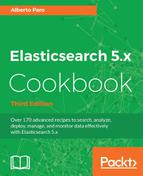In the previous recipes, we have seen several type of queries that use text to match the results. The query string query is a special type of query that allows defining complex queries by mixing the field rules.
It uses the Lucene query parser to parse text to complex queries.
You need an up-and-running Elasticsearch installation as we described in the Downloading and installing Elasticsearch recipe in Chapter 2, Downloading and Setup.
To execute curl via the command line, you need to install curl for your operative system.
To correctly execute the following commands, you need an index populated with the chapter_05/populate_query.sh script available in the online code.
For executing a query_string query, we will perform the following steps:
- We want to search for text
nice guy, but with a condition of discarding the termnotand displaying a price lesser than5. The query will be:curl -XPOST 'http://127.0.0.1:9200/test-index/test- type/_search?pretty=true' -d '{ "query": { "query_string": { "query": ""nice guy" -parsedtext:not price:{ * TO 5 } ", "fields": [ "parsedtext^5" ], "default_operator": "and" } } }' - The result returned by Elasticsearch, if everything is alright, should be:
{ "took" : 17, "timed_out" : false, "_shards" : { "total" : 5, "successful" : 5, "failed" : 0 }, "hits" : { "total" : 1, "max_score" : 3.8768208, "hits" : [ { "_index" : "test-index", "_type" : "test-type", "_id" : "1", "_score" : 3.8768208, "_source" : { "position" : 1, "parsedtext" : "Joe Testere nice guy", "name" : "Joe Tester", "uuid" : "11111", "price" : 4.0 } } ] } }
The query_string query is one of the most powerful types of queries. The only required field is query that contains the query that must be parsed with Lucene query parser (For more information, refer to the link: http://lucene.apache.org/core/6_2_0/queryparser/org/apache/lucene/queryparser/classic/package-summary.html.
Lucene query parser is able to analyze a complex query syntax and convert it in many of the query types that we have seen in the previous recipes.
The optional parameters that can be passed to the query string query are:
default_field: This defines the default field to be used to the query. It can also be set at index level defining theindexpropertyindex.query.default_field(default_all).fields: This defines a list of fields to be used. It replaces thedefault_field. Thefieldsparameter also allows using wildcards as values. (that is,city.*).default_operator: This is the default operator to be used for text inqueryparameter (the defaultOR; the available values areANDandOR).analyzerThis is the analyzer that must be used for query string.allow_leading_wildcard: Here, the*and?wildcards are allowed as first characters. Using similar wildcards gives performance penalties (defaulttrue).lowercase_expanded_terms: This controls if all expansion terms (generated by fuzzy, range, wildcard, and prefix) must be lowercased (defaulttrue).enable_position_increments: This enables the position increment in queries. For every query token, the positional value is incremented by1(defaulttrue).fuzzy_max_expansions: This controls the number of terms to be used in fuzzy term expansion (default50).fuzziness: This sets the fuzziness value for fuzzy queries (defaultAUTO).fuzzy_prefix_length: This sets the prefix length for fuzzy queries (default0).phrase_slop: This sets the default slop (number of optional terms that can be present in the middle of the given terms) for phrases. If it sets to zero, the query is an exact phrase match (default0).boost: This defines the boost value of the query (default1.0).analyze_wildcard: This enables the processing of wildcard terms in the query (defaultfalse).auto_generate_phrase_queries: This enables the autogeneration of phrase queries from the query string (defaultfalse).minimum_should_match: This controls how manyshouldclauses should be verified to match the result. The value could be an integer value (that is, 3) or a percentage (that is, 40%) or a combination of both (default1).lenient: If it's set to true, the parser will ignore all format-based failures (such as text to number of date conversion) (defaultfalse).locale: This is the locale used for string conversion (defaultROOT).
The query parser is very powerful to support a wide range of complex queries. The most common cases are:
field:text: This is used to match a field that contains some text. It's mapped on a term query.field:(term1 OR term2): This is used to match some terms inOR. It's mapped on a terms query.field:"text": This is used to match the exact text. It's mapped on a match query._exists_:field: This is used to match documents that have a field. It's mapped on an exists filter._missing_:field: This is used to match documents that don't have a field. It's mapped on a missing filter.field:[start TO end]: This is used to match a range from thestartvalue to theendvalue. Thestartandendvalues could be terms, numbers, or a valid datetime value. Thestartandendvalues are included in the range; if you want to exclude a range, you must replace the[]delimiters with{}.field:/regex/: This is used to match a regular express.
The query parser also supports text modifier, used to manipulate the text functionalities. The most used ones are:
- Fuzziness using the form
text~. The default fuzziness value is2, which allows a Damerau-Levenshtein edit-distance algorithm (http://en.wikipedia.org/wiki/Damerau%E2%80%93Levenshtein_distance) of 2. - Wildcards with
?that replace a single character or*to replace zero or more characters. (that is,b?llorbi*to match bill). - Proximity search
"term1 term2"~3, allows matching phrase terms with defined slop. (that is,"my umbrella"~3matches"my green umbrella","my new umbrella", and so on).
- Refer to the Lucene official query parser syntax at http://lucene.apache.org/core/6_2_0/queryparser/org/apache/lucene/queryparser/classic/package-summary.html that provides a complete description of all the syntax
- The official Elasticsearch documentation about query string query at https://www.elastic.co/guide/en/elasticsearch/reference/master/query-dsl-query-string-query.html
